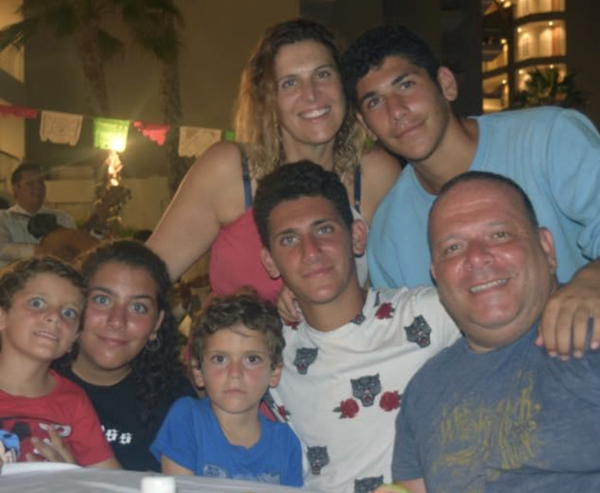
Ariel, Avigayil, Liam, Sagie and Isaac, at a Mexican restaurant in San Diego.

Other items in today’s column include
*Israel Philharmonic teams up in their homes for Pesach melodies
*Coronavirus and animals
*Passover doings
*

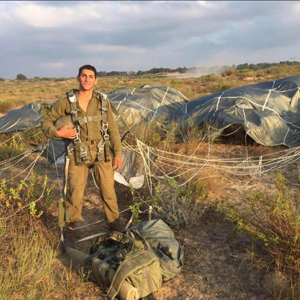
SAN DIEGO — Sometimes in the morning, sometimes at night, Israel Defense Forces Corporal Sagie Shpigelman, 19, of San Diego patrols Israel’s border with Gaza along with other members of his paratrooper platoon, which includes his younger brother Amit. The brothers are what is known in Israel as “lone soldiers” –that is, soldiers in Israel on their own, without parents in Israel. This year, they and other members of their platoon will have their Passover seder together, rather than returning to homes throughout Israel to be with their families or friends.
In a telephone interview Tuesday that was arranged by Friends of the Israel Defense Forces (FIDF), Sagie said he made the decision to serve in Israel’s military shortly after visiting the country with other graduating seniors of the San Diego Jewish Academy. The SDJA students had been on a trip which had taken them first to Poland for a week, and then for the next week to Israel. The trip coincided with the annual March of the Living, but it was conducted under different auspices.
The first week in Poland “was a very monumental week for me,” Shpigelman told me. “It was very eye-opening to see everything that had happened in the history of the Jewish people and really made me want to defend my culture, my people, and state.”
The second week in Israel coincided with Yom HaZikaron (Israeli Memorial Day) followed one day later by Yom Ha’atzma’ut, Israeli Independence Day. Although he had been in Israel before, in summer camp, that trip presented “a drastic change–how I felt emotionally in Poland versus how I felt emotionally on that day in Israel. How proud I was to be an Israeli, to have an Israeli background, and my Jewish background.”
Shpigelman’s parents — Isaac and Sharon Shpigelman –both were raised in Israel, later immigrating to the United States. Sagie was born in Pennsylvania in 2000, and when he was 8 the family moved to San Diego. He attended elementary school at the Chabad Hebrew Academy in Scripps Ranch, then went to public school at Carmel Valley Middle School and Carmel Crest Academy, before enrolling for 11th and 12th grade in San Diego Jewish Academy from which he graduated.
Raised fully within the Jewish world, Sagie was a member of the Israeli Scouts, and also attended J-Teens events conducted by Rabbi Zevi New. He counts Rabbi Daniel Bortz as a friend. His family regularly attended services with the Sephardic minyan that meets at Chabad of University City. Yes, it’s true, Shpigelman said, his family is Ashkenazic but his father prefers the Sephardic rites. Sagie’s great grandparents on his father’s side had lived in Poland and survived the Holocaust — one of the reasons that Sagie’s trip to concentration camps and other venues in Poland was so emotional.
I asked him to describe a typical day along the Gaza border. “Depending on what job I have to do during the day, I generally wake up between 6 and 7 am. We have patrols, and if that’s my job for the day, I go on the morning patrol, come back and eat breakfast, lunch, or dinner,” he responded. “The days vary, not always do we have something planned. If not, we might walk guard duty.” The platoon does a lot of physical exercise, “trying to keep ourselves in shape” and also has training exercises. “The normal day isn’t too hectic.”
While some other IDF units have been assigned to supply needy civilians in hard in areas hard hit by the coronavirus, such as Bnei B’rak, “they wouldn’t pull us off the border” because “I assume what we are doing now is just as important.”
Typically, he said, his platoon will remain in Gaza for two or three weeks at a time before being given a weekend off to visit friends or relatives. Sometimes, during the two-to-three week stretch “care packages” will arrive for Lone Soldiers from the FIDF . “It is probably one of the most wonderful things when we get a care package; it brightens up the mood and the day.” Different packages will have different goodies inside, such as “snacks, blankets, pillows — any basic necessity that we need.” Whether the items inside is “something as small as a Hershey Kiss,” or larger, “knowing that someone put in their time and effort to get it all the way here, it makes us feel great.”
As lone soldiers, Sagie and Amit get to go home for a month each year of their two year, eight month enlistments — and, in fact, Sagie had a home visit just two months ago. The home visit “I think, is the best benefit that I can have as a Lone Soldier.”
Asked what’s next in his life, Sagie said he wasn’t certain. With approximately 20 months to go on his enlistment, he hasn’t thought much past that. However, he said he does believe one day he will raise his family in Israel, perhaps in the Jezreel Valley, which he loves because it is so green.
His mother, Sharon, reached in San Diego, expressed mixed feelings of pride and worry discussing her two sons, as well as daughter Avigayil who has made known her intention to join the IDF in a year or so.
Both Sharon and her husband served in the IDF, and “we love Israel a lot,” participating frequently in pro-Israel events ever since they moved to the United States, where they have owned clothing and ice cream stores, and where Isaac works here, in San Diego, as a cement contractor. “We always want to be supportive of Israel,” she said, “but on the other hand, we are sending them off to a war. We know that they’re going to be fighters, and you don’t want any harm to your kids.”
When Sagie first announced he was joining, she recalled, “I told him life in San Diego is very comfortable. You can go to college. I’ll get you a car, pay for school.” However, she said, he and his siblings replied, “This is a decision that we have made” and she stands by them.
*
Israel Philharmonic teams up in their homes for Pesach melodies

For David Amos, the conductor of the Tifereth Israel Community Orchestra, the video above of the Israel Philharmonic Orchestra (IPO) playing Passover melodies from their homes via Zoom brings back fond memories of the 1980s when he conducted that same orchestra numerous times on the invitation of its late principal French horn player Meir Rimon.
The relationship started when Rimon contacted Amos from Israel, saying that he liked hearing Amos’s orchestra, which then was known as the Jewish Community Center Orchestra, back when the JCC was located on 54th Street. After playing as a visiting artist with the San Diegans, he arranged for Amos to be invited to guest conduct the IPO. He said he had the orchestra reserved for one week, and “as it turned out that one week came right after Leonard Bernstein had conducted them in a series of concerts and one week before Zubin Mehta was scheduled to return.”
The first week resulted in the recording of a vinyl record album titled “Old Wine in Modern Vessels” in which old Jewish melodies were arranged for a modern orchestra with a French horn solo. Amos went on to make five other recording with the IPO, which were made into compact disks on the Crystal label.
Many of the musicians in the orchestra at that time had been members of the Palestine Symphony, which had been formed in 1936, and who were not yet retired. “I was able to listen to their stories.” he said the IPO musicians were “fiercely independent, very dedicated to their music making, and quite undisciplined. They told me themselves ‘we are the most undiscliplined orchestra, but we have the most heart.’ For them recording and rehearsing was one big party, not only with me, but they were like that with Zubin all the time.
“That first year, my wife, Lee, was with me, and at the last moment they had one of their violinists cancel. She had been my principal violin at the JCC, so she ended up participating in the recording. Lee saw the chaotic way they rehearsed, and she asked her stand partner if this was the way they always behaved. He answered, ‘Hell no, we’re being nice to David.”
Amos added that orchestra members “were cutting up in a pleasant way, not a mean, annoying way.”
*
Coronavirus and animals
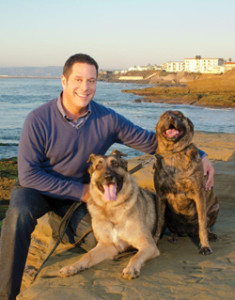
Noting the news story about a tiger at the Bronx Zoo testing positive for Coronavirus, Gary Weitzman, president and CEO of the San Diego Humane Society, messaged that this “doesn’t change what we already know about communicability of the virus by or from our pets: While both cats and dogs can test positive from what we’ve seen in Hong Kong and now the Bronx, it is not believed that either can give us COVID-19. We, on the other hand, may be able to give it to them. If you’re infected with COVID-19, don’t cuddle with your pets. There’s a risk they could get COVID-19 from you. Also, be sure your pet is practicing social distancing from other people and pets right now. For their health, don’t let anyone outside of your household pet your dog or cat.”
*
Passover doings
Jenn Lindsay, a San Diegan now living and teaching in Rome, has been asked to lead an online seder for Beth Hillel Rome, a Reform congregation. She will conduct it both in English and Italian based on a Haggadah written by Rabbi Rachel Barenblat. … The Yiddish Academic and Arts Association of North America (YAAANA) plans to conduct a “Yiddishized” seder in which Pesach Yiddish vocabulary will be taught via Zoom at 11 a.m., Thursday, April 9, for those who register via this email. … Rabbi Devorah Marcus of Temple Emanu-El messages: “…While Passover marks the beginning of the spring and the hope for a new year, there is also a lot of uncertainty to come. Will the spring rains come? Will our harvest be full and plentiful? Will we have full hands at the end of the harvest, or will we be empty? I think these are questions we relate to now. The uncertainty of our current situation is anxiety-ridden. it can be hard for us to muster the energy and spirit to celebrate. But perhaps the message of Passover is exactly what we need now. Even in the midst of uncertainty, even when we do not know how everything will turn out, we take this moment to celebrate. We take a moment to find gratitude for our freedom, for our community, for the blessings we share. We take a moment to reconnect with our tradition, with our most cherished narrative…” … Rabbi Dr. Michael Leo Samuel invites members of the community to join Temple Beth Shalom’s virtual seder at 5:30 p.m, Wednesday, April 8. To attend contact Beth Shalom’s President, Arlene LaGary, at 858 344 5632.
*
San Diego County Judaica
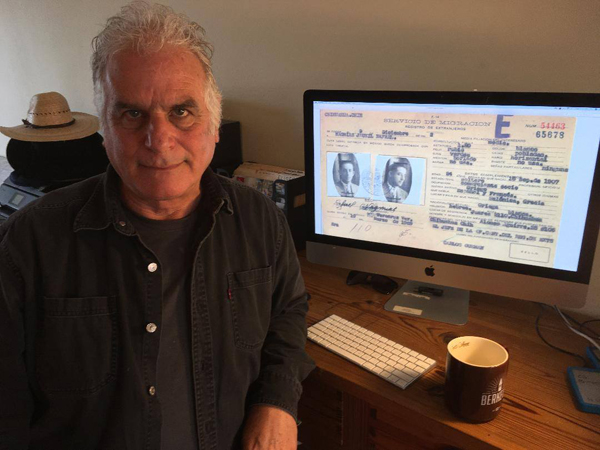
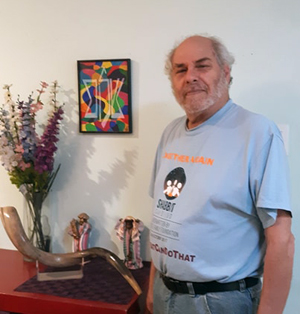
Isaac Artenstein, whose film credits include To the Ends of the Earth: A Portrait of Jewish San Diego” shows on his computer screen one of his favorite items of Judaica: “my Grandfather Rafael Najmías Guakil Immigration Card from the Mexican Government. It reads that he arrived in Veracruz, Mexico 19th of March, 1929 from Salonique, Greece and the he was of the “Hebrew” religion. It also says that he spoke Spanish, Greek and French. It shows his address in Chihuahua, Mexico (which my mother visited a couple of years ago). I also have the same documents of my grandfather’s father, Roberto, his mother Victoria, and sister Luisa who arrived on the same boat.” … At left, Alan Goldenberg, poses with a brightly colored painting by his wife Giela Gray that features in stylized Hebrew caligraphy “Shalom.” He says of Giela: “She does love to mix up colors for the variety. If you look, you will see purple in there. That is our favorite color.”
*
Donald H. Harrison is editor of San Diego Jewish World. He may be contacted via donald.harrison@sdjewishworld.com